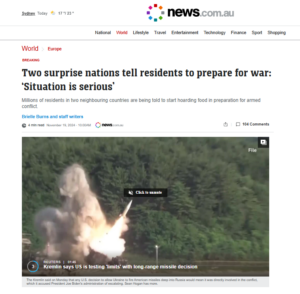The Looming Shadow of War in Europe: Why It Matters Now More Than Ever

As tensions spiral in Europe, the drums of war are beating louder, notably in Sweden and Finland, where authorities are urging citizens to prepare for conflict. This alert comes against a backdrop of burgeoning desperation among European leaders striving to maintain a precarious Eurozone and seeking potential avenues for debt defaults. However, the average individual—be it in Russia, Europe, the USA, Canada, Japan, or China—longs for peace, not war. In this climate of escalating rhetoric, the question arises: why the push for conflict when the desire for tranquility seems universal?
The Undersea Cable Incident: A Sign of Hybrid Warfare
Just recently, Germany and Finland opened an investigation into the severing of an undersea cable that connects both nations, sparking warnings about "hybrid warfare," particularly in light of the ongoing tensions with Russia. This incident follows the destruction of the NordStream Pipeline, an action widely attributed to U.S. interests, further amplifying regional instability. The joint statement from several European foreign ministers expressing "deep concern" over these developments signals just how fragile the situation has become.

In the midst of this turmoil, German Chancellor Olaf Scholz made headlines by urging Russian President Vladimir Putin to withdraw his troops from Ukraine and choose negotiation over aggression. Putin’s response emphasized the need to consider "new territorial realities," a nod to the long-standing disputes surrounding regions like the Donbas.
The Historical Context of Conflict
To truly understand the stakes, we must reflect on the historical context. The ongoing conflict has its roots in deep-seated ethnic tensions. For instance, the tragic massacre of Russians in Odesa back in 2014 initiated a chain reaction that has led to the current hostilities, with harsh measures instituted against Russian culture and identity by the Ukrainian government under President Zelensky.
Indeed, this echoes the tragic breakup of Yugoslavia along ethnic lines—an all-too-recurring theme in geopolitical conflicts. The question begs: is a resurgence of war worth the price of destruction across Europe? History shows us that military endeavors often lead to devastation rather than resolution, a lesson learned through the failures of leaders like Napoleon and Hitler.

The old adage, "If you don’t learn from history, you are doomed to repeat it," could not be more relevant.
The Broader Implications of War and Ethnic Hatred
Let’s face some uncomfortable truths: should Russia decide to withdraw, the potential violence against ethnic Russians in Ukraine could erupt. This is not just a territorial dispute but a manifestation of centuries of ethnic animosity that continues to afflict various global scenarios, including the complex strife in the Middle East.

As we reflect on these realities, we can draw parallels to Herman Goring’s chilling statements during the Nazi regime. He spoke to the nature of societal manipulation, a theme explored extensively by psychologist Stanley Milgram in his pivotal work, Obedience to Authority. The findings suggest that ordinary people are often more pliable than we would like to believe, easily swayed into supporting conflicts when spurred by authority.

The Call for Discernment and Dialogue
At Extreme Investor Network, we believe it is imperative to approach such discussions with a discerning eye. The average citizen yearns for a peaceful existence, yet government rhetoric can sometimes push for war, exploiting our fears for political gains. This is a crucial moment for dialog and diplomacy, a chance to break free from the cycle of conflict that has defined so many regions.
As we navigate these perilous waters, let’s not gloss over the importance of an informed and engaged populace. Education and open dialogue are our most powerful tools in combating the rising tide of militarism in Europe and beyond.
In these trying times, we urge our readers to reflect on what kind of future we want to foster. In a world rife with division, the need for unity and understanding has never been more critical.
Join us at Extreme Investor Network for more insights and discussions on these pressing global issues. Together, we can learn from the past and forge a future that prioritizes peace over conflict.

